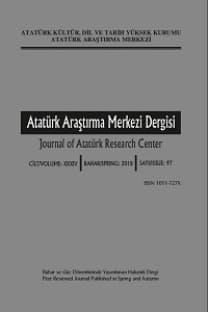Başlangıçta Atatürk'ün Hareketi : Yabancıların Görüşleri (1919-1921)
Bu makale Müttefiklerin Türkiye içindeki milliyetçi hareketin getirdiği dinamik değişimleri nasıl anlayamadıklarını ve Mustafa Kemal'in Müttefiklerin Sevr Antlaşması'nın hükümsüz kılınması için yargılama ve analiz hatalarından nasıl yararlandığını inceliyor. Dışarıdan gelenlerin görüşleri, onun nonogmatik ve bazen kararsız duruşuna biraz ışık tutabilir. Ayrıca, kendini ilan eden bir yarı tanrı veya mucize bir işçinin psikolojik profilini çizmeye çalışanların varsayımlarının aksine, Mustafa Kemal’in iç politikası tartışmasız bir lider olmadığına dair farkındalığına çok iyi işaret ediyor. Öte yandan uluslararası düzeyde kabulü, Avrupa'daki Bolşevizmin savaş yorgunluğuna ve korkusuna, Müttefiklerin ulusal çıkarlarına karşı çıkmaya ve Müttefiklerin dikkate alması gereken Türkiye'ye yönelik Müslüman duygularına çok şey borçluydu. Mustafa Kemal, Kemalist hareketin başında yabancı gözlemcilerin değerlendirmelerine dayanarak bile iyi bir diplomatist ve büyük bir stratejist olarak ortaya çıkıyor.
Anahtar Kelimeler:
Atatürk, Müttefikler, Ulusal Hareket, Yabancı Devletler
Atatürk's Movement At Its Start: The Views Of Outsiders (1919-1921)
This paper examines how the Allies failed to understand the dynamic changes within Turkey that were brought on by the Nationalist movement, as well as how Mustafa Kemal exploited the Allies’ errors of judgment and analyses to have the Treaty of Sevres rendered null and void. Views of outsiders may shed some light into his nondogmatic and at times ambivalent stance. Furthermore, contrary to the assumptions of those who try to draw the psychological profile of a self-proclaimed demigod or a miracle worker, Mustafa Kemal’s domestic politics point only too well to his awareness that he was not an undisputed leader. His acceptance at the international level, on the other hand, owed a lot to the war-weariness and the fear of Bolshevism in Europe, opposing national interests of the Allies, and Muslim sentiments towards Turkey which the Allies had to take into consideration. Mustafa Kemal emerges as a fine diplomatist and a great strategist even at the beginning of the Kemalist movement based on the evaluations of foreign observers.
Keywords:
Atatürk, The Allies, National Movement, foreign states,
___
- Falih Rıfkı Atay, Çankaya (İstanbul: Doğan Kardeş Matbaacılık Sanayi A.Ş. Basımevi, 1969), pp. 170-172
- J.C. Hurewitz (Ed), Diplomacy in the Near and Middle East, Vol. II, 1914-1956 (Princeton: D. Van Nostrand, 1956), pp. 36-37
- E. L. Woodward and R. Butler (Eds), Documents on British Foreign Policy, 1919-1939, Series I, Vol. IV, (London: Oxford Univesity Press, 1952-), p. 654
- Şevket Süreyya Aydemir, Makedonya’dan Ortaasya’ya : Enver Paşa, vol. Ill (İstanbul: Remzi Kitabevi, 1978), p. 520
- The Times, August 5, 1919
- İzzet Oztoprak, Kurtuluş Savaşında Türk Basını, Mayıs 1919-Temmuz 1921, (Ankara: Türkiye İş Bankası Kültür Yayınlan, 1981), pp. 100-101
- Roderic H. Davison, “From Mudros to Lausanne,” The Diplomats, G. Craig and F. Gilbert (Eds), (Princeton, Newjersey: Princeton University Press, 1953), p. 179
- Sabahattin Selek, Anadolu İhtilâli, (İstanbul: Doyuran Matbaası, 1981), p. 85
- The New fork Times, November 10, 1919
- Mark Lambert Bristol, “War Diary”, 25 May 1919. Unpublished Rapers. The Library of Congress
- Blaine D. Smith, Turkey: Origins of the Kemalist Movement (1919-1923), (Washington, D.C.: Judd and Detweiler Inc., 1959), p. 23
- The Times, November, 1919
- Bristol, “War Diary”, op. cit., 25 May 1919
- The New Tork Times, May 31, 1919
- Alptekin Müderrisoğlu, Kurtuluş Savaşının Mali Kaynaklan (Ankara: Maliye Bakanlığı 50. Yıl Yayınlan, 1974), p. 521
- Jane Degras (Ed), Soviet Documents On Foreign Policy, Vol. I (1917-1924), (London: Oxford University Press 1951), pp. 164-167
- Gaston Gaillard, The Turks and Europe, (London: Thomas Murky and Co., 1921), p. 87. (The French edition of the book is dated August 1920)
- The Times, March 12, 1920
- British Documents, op. cit., p. 914
- Soviet documents on Foreign Policy, op. cit., pp. 237-242; Diplomacy in the Near and Middle East, op. cit., pp. 95-96
- Frank H. Simonds, “Greek vs Turk: A New Phase of the Eastern Question,” American Review of Reviews 62 (Aug 1920), pp. 159-168
- Walter Laqueur, Communism and Rationalism in the Middle East, (New York: Frederick A. Praeger Publishers, 1956
- The Turk on Top Again,” Outlook 126 (Dec, 1920), pp. 670-671.
- ISSN: 1011-727X
- Yayın Aralığı: Yılda 2 Sayı
- Başlangıç: 1984
- Yayıncı: Atatürk Kültür, Dil ve Tarih Yüksek Kurumu Atatürk Araştırma Merkezi
Sayıdaki Diğer Makaleler
Cumhuriyetin Kuruluşu ve İlk Onbeş Yılında PTT İşletmesi
İrtica Olayları Karşısında Atatürk
Türk Eğitiminin Batılılaşmasını Belirleyen Dinamikler
Journal de Geneve'de Türk Bağımsızlık Savaşı Günlüğü
Mustafa Kemal Büyük Taarruz Gününü Bütün Dünyadan Nasıl Gizli Tuttu?
Atatürkçü Düşüncenin Temeli: Laiklik
Kemalist Dönemde Türkiye'de Fransızca Yayın Tapan Basına Toplu Bir Bakış (1919-1938)
İkinci İnönü Zaferinin Sonuçları
Başlangıçta Atatürk'ün Hareketi : Yabancıların Görüşleri (1919-1921)
